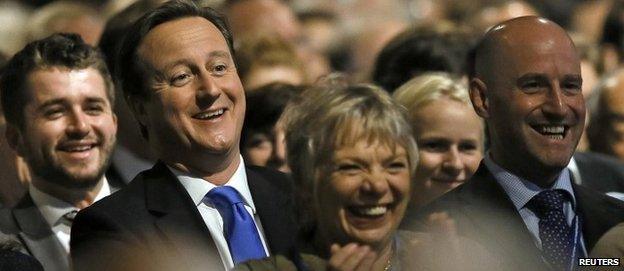Whatever happened to the happiness agenda?
- Published

Long ago, before recession, before austerity, before the coalition, David Cameron had a dream.
Why, he asked, was Britain, like the rest of the developed world, so obsessed with Gross Domestic Product (GDP)? What did this cold, clinical measure of industrial output have to do with how happy or fulfilled anyone actually felt at any given time?
Why not measure GWB (General Well Being) instead? Surely, that was more important to people.
It was an interesting idea, that generated a bit of debate and helped Mr Cameron in his mission to rebrand the Conservative Party.
Most people assumed it had been quietly dropped, another casualty of harsh economic times.
But it is still very much alive. And the man charged with keeping it that way appeared before a committee of MPs on Wednesday.
For a man in the happiness business, Nick Hurd does not smile very much.
The BBC's Mark Easton says well being is about a lot more than money
You can't really blame him. The "happiness agenda" seems to have generated an especially impenetrable brand of Whitehall jargon which would wipe the smile off the face of the cheeriest of characters.
Here is what one of the officials Mr Hurd had brought with him had to say about one aspect of it.
"It is quite a different approach, to drive integration, to compare, essentially apples and oranges, in policy work, so you can either bottom up by monetising these different forms of capital and re-expressing it in a lot of work, or you can take a different approach and that's what some of the well-being work the Cabinet Office has been doing."
Is that clear?
The problem, as Mr Hurd kept reminding the committee, is that happiness is a very difficult concept to measure. You are constantly "tip-toeing" towards "stating the bleeding obvious", he told them.

The Office for National Statistics was doing fine work in coming up with new ways of measuring personal fulfilment but it is at an early stage of development, he added.
The civil society minister could not think of a specific example of where the happiness agenda had influenced government policy. But important ministers were "engaging" with it.
And no one should be in any doubt about how seriously it was being taken in government - because "it comes from the prime minister", who remains very passionate about it apparently. There is a small, but very senior, committee gently "nudging" the whole thing forward.
Third runway
The stats that had come in so far from the ONS might be a bit crude but, suggested Mr Hurd, they contained a hint of something genuinely exciting - a level of insight into voters' lives that had never been seen before.
Why, for example, are people in Stoke-on-Trent less content with life than those in other towns? It's something to do with their personal "characteristics" apparently.
And what about Swansea? Why are its inhabitants so miserable? (No one seems to know).
People in Richmond-on-Thames are about as happy as anyone else, according to the stats, but they have higher levels of anxiety. Cabinet Office official David Halpern suggested this might be down to the noise of the planes from nearby Heathrow.
At this point, Zac Goldsmith's ears pricked up.

Zac Goldsmith, left, at a Heathrow protest with a fluffy rabbit and Boris Johnson
The Richmond Park MP is a member of the environmental audit committee, although he is better known for his campaign against a third runway at Heathrow.
"The Cabinet Office's Dr David Halpern tells @CommonsEAC that aircraft noise significantly & measurably increases anxiety around Heathrow," tweeted Mr Goldsmith, as he listened to Mr Halpern's theory., external
Could this be the first recorded example of the happiness agenda influencing a policy debate? It is probably not what David Cameron had in mind when he came up with the idea. But it's a start.